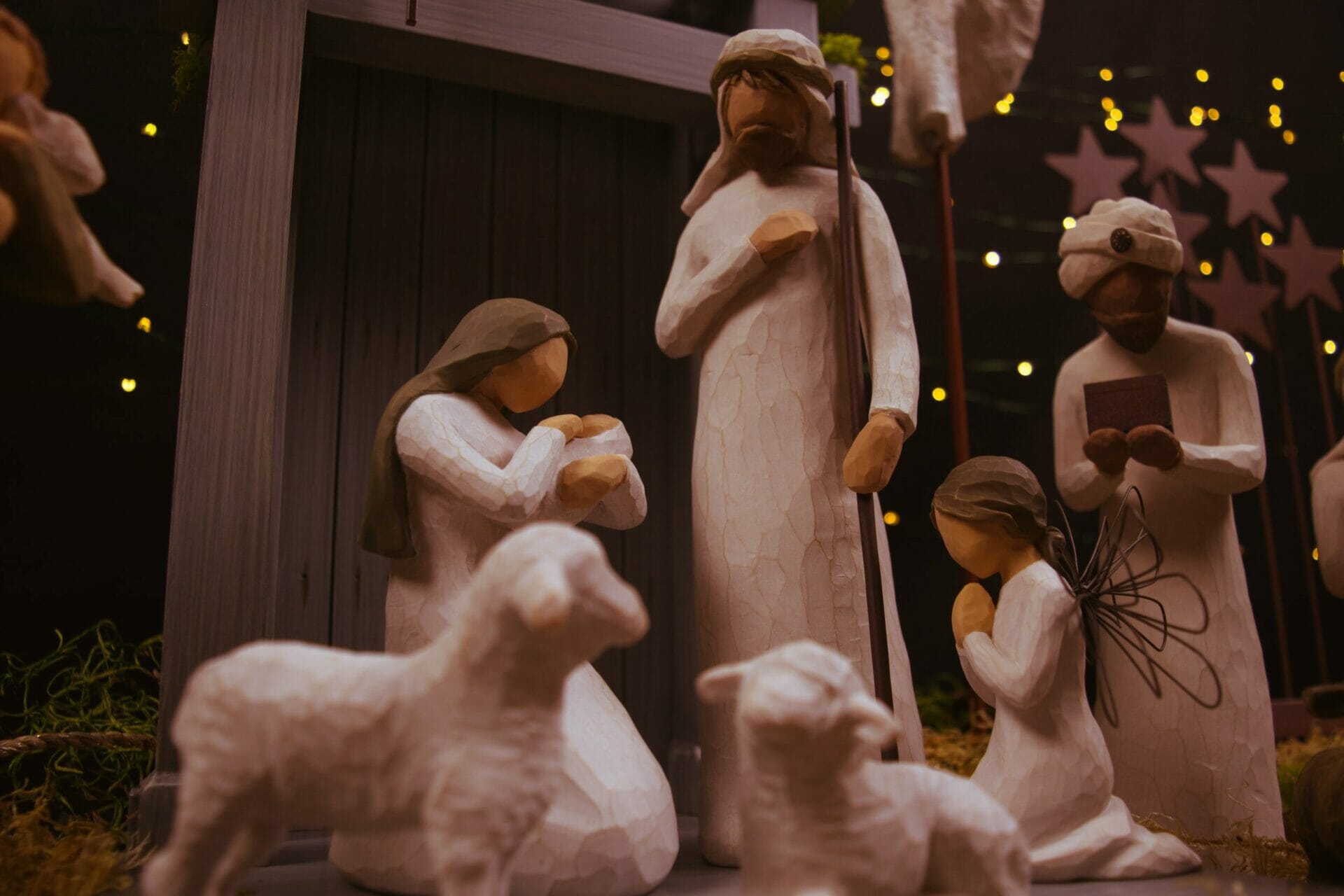“Long lay the world, in sin and error pining
‘Til He appeared and the soul felt its worth
A thrill of hope, the weary world rejoices
For yonder breaks, a new and glorious morn”
Composed by Adolphe Adam, lyrics by Placide Cappeau
As a kid, I counted down the days: December 18th; December 19th; December 20th… The school semester’s end eluded me like the swimmer’s reach for the wall.
Oh, how I longed to relax in the warmth of fresh cookies, the sparkle of the Christmas tree, and ribbon-wrapped gifts. Fast forward to present day and now my nine year old son, on a daily basis, asks, “Dad, how many more days until Christmas break?” I feel a tension in his longing. Many days, especially in this year of pandemic, I share it—we all share it.
While society winds down its calendar year in December, Christians are just beginning their year with the season of Advent. The last Sunday of November and concluding with Christmas day are the days that mark Advent. Our collective calendars overlap thematically in December. School children and the employed, alike, hang on until the holiday break. Our communities need a rest after the frenetic rhythm and demands of daily life; and we take it. Likewise, the Christ-follower begins his year with a season of longing and tension as we embrace the reality of this broken world, but these days not only provide physical rest but more importantly the offering of hope by prophets of a New Covenant brought by the birth of the Messiah King.
The tension of Advent releases on Christmas day! I cannot think of a more appropriate way to start the Christian year. Bam!
Right up front we get the scope and sequence of the Gospel: broken, damaged goods, suffering, people at odds. Help! Oh, Lord! Fix, save, rescue us! We are left longing for a Savior, and then the thrill of hope, Jesus Christ, comes on Christmas day. Fall on your knees! There is, indeed, a new glorious mourn!
Some in the faith bemoan the way Christ is disappearing from Christmas as each year passes. And while we should grieve the culture, not all hope is lost. God uses our culture’s embrace of the Christmas season both to teach Christians how to witness in the workplace and to reveal Himself to non-believers. It is worth pausing to unpack these ideas and to then apply some lessons for when early January arrives, and our rhythms at work pick up again.
Pop Culture
During December, interestingly, pop culture also celebrates moving from brokenness to salvation. The theme of suffering met by some form of salvation permeates the cinema of Christmas. Virginia’s doubting angst is relieved as she is shown, “Yes, Virginia, there is a Santa Claus.” George Bailey, after experiencing the alternative possibility of poverty, addiction, and communal decay learns “It is A Wonderful Life.” And of course through Ebenezer Scrooge, Charles Dickens presents a depressed and crotchety old man saved from his own greed and cynicism by presentations of ghosts from Christmas past, present, and future.
Band Aid was a fundraising effort in 1984 for a horrific Ethiopian famine. The song that captured everyone’s attention, and remains a Christmas radio staple, is, “Do They Know It’s Christmas?” Simon Le Bon of Duran Duran sings, There’s a world outside your window, and it’s a world of dread and fear. Sting builds on the description of the broken world with, Where the only water flowing is the bitter sting of tears. Boy George and others capture (albeit colonialistically by today’s standards) the essence of the song in its chorus asking:
And there won’t be snow in Africa this Christmas time
The greatest gift they’ll get this year is life
Where nothing ever grows, no rain or rivers
How do they know it’s Christmas time at all?
The salvific release from the tension of such suffering comes from the pop stars by urging the listener to,
Feed the world, feed the world
Let them know it’s Christmas time again!
Salvation comes to starving Ethopians from the people and countries of the world bringing food, and in so doing, reminding them it is Christmas, a time to feast, be generous, and share with another. Doesn’t this sound familiar?
While the cultural and Advent seasonal themes parallel one another, the source of the salvation differs profoundly. The sources of salvation in the examples above range from global food relief, to fictitious characters renewing child-like wonder, and self-realization through a gain in perspective. The message to our citizens suggests salvation comes from within us and when we come together.
Advent points the world toward an external savior: Christ. Advent is a season to lament, recognize, and unite in the face of the sin and error pining all around. Then, the hope, joy, and peace arrives in more, but not less, than a babe born in Bethlehem. Salvation comes in God uniting with human flesh to bring about the salvation of the creation. Jesus, lived on earth teaching and showing his ways. Jesus willingly died on a cross satisfying the wrath and justice of God. And Jesus sits at the right hand of the Father until his return and complete eradication of the pining. Oh, hear the angels rejoicing!
God At Work in the World
“God’s purpose is constantly being realized in the actual course of events” (Kuiper, 206). Quite revolutionary was this view of the Genevan scholar and pastor John Calvin. Nature and grace were not at odds, as the Roman Catholic proposed. The presence of sin and fallenness in the course of worldly events had not either been abandoned by God or exceeded His sovereign control. Rather, through the work of common grace can God both be behind and in the events of culture.
This is helpful. We can accept the cultural celebrations of Christmas, even without the Jesus part, seeing them as good gifts of the Father sent to be a blessing. Band Aid has a place; It’s A Wonderful Life has purpose. The artifacts of culture are a grace from God seeking our well-being as Christ followers. Moreover, we co-labor with God using elements of our culture as evangelistic tools to draw others unto Him.
Our Wellbeing
God’s works of common grace are for the well-being of the faithful. Herman Kuiper writes, “God has the advancement of His Church and the well-being of His elect in mind when He dispenses various gifts of common grace.” Formation, especially for the young during a holiday season, comes from the church, but also the world around us. Nothing compares to the formative role Scripture plays in telling us of God’s mission to the world. The Gospel is clear. And, in addition to God’s Word, there can be a place for such joyous stories of Rudolph the Red Nosed Reindeer and Frosty the Snowman.
The stories of these two hallmark characters at Christmas stand tall in my childhood memories. The awkward figurine animation of these wintery protagonists formed me early on. I knew when they appeared on television, the season had begun! I identify still with Rudolph’s rejection. Frosty’s kindness is in me; do I always show it? I wanted so badly to lead a team of reindeer through the air both for the confidence it would ensue, and the thrill of the simple act. When the parson appears to do Frosty’s wedding, did I sense then my future calling?
I was formed in the basics of storytelling, adventure, and character development. Earl Palmer, a Lewisian scholar and retired pastor, speaks of a good story having both a catastrophe and a eu-catastrophe. A catastrophe presents the problem or the conflict that the characters must resolve. The best of stories have a eu-catastrophe. Using the Greek prefix eu, which means good, a eu-catastrophe does not merely have a good ending, but a great triumph over the original problem that ends up being transformative. Just as the season of Advent leads us through the catastrophe of our world to the eu-catastrophe of Jesus’ birth, cultural practices and artistic representations settle in our hearts and minds a direction, a movement, a telos. We are prepared for the Gospel story to bring the eu-logy for our lives.
Inspire the Orderly Life
We are formed for the greater work of God in cultural artistic expression; likewise we are taught how to avoid further brokenness that disorders our lives. For many, the disordering brings one even further from the good news of the Gospel. For the Christ follower, many a fable, poem, grand narrative, or cinematic blockbuster can teach wisdom—can teach the proper ordering of life. The stories a society tells is one means for shaping the next generation and passing along truth. Certainly, not all such stories are redemptive or formational in the direction of virtue, but God uses the virtuous stories of people to help them learn how to thrive as a culture.
Draw Unto Him
The work of common grace God does in the Christmas season works to draw all men and women unto Him. Kuiper shows us,
…God in various ways manifests His goodness to men at large in order that He may turn them from their sins and allure them to Himself (Kuiper, 207).
When God’s mission to the world of redemption and restoration are depicted in culture, we see that redemption is possible. We experience in our hearts and emotions such a journey. Then, when the Holy Spirit moves, and the eu-catastrophe of Christ enters our hearts, the way is paved. A common language and experience, from art especially, offers us, as Christ’s ambassadors, a platform to parlay the story of God.
The following excerpt from Kuiper, albeit long, is a beautiful examination of Scripture seeing God’s goodness and grace that shows the non-believer that yes, indeed, God is on our side:
God displayed His wonderful kindness when He postponed executing extreme vengeance on the first world for more than a century (Gen. 6, 3); that God knew how ill He was bestowing His benefits on the impious Israelites and yet continued to contend with their wickedness by heaping blessings upon them in order that His goodness might be more conspicuous (Deut. 31, 20-22); that God bears with many sins and crimes and does not entirely destroy mankind, because He wishes to maintain His inviolable decree that the ear shall be inhabited (Is. 45, 18); that God saved all the two hundred and seventy-six who sailed with Paul in order that the power which He manifested in His servant might be more illustriously displayed (Is. 65, 9); that God promised restoration to the Egyptians because He wished to reveal His clemency in His judgements on heathen nations (Jer. 46, 26); that God so suspended judgement on Nineveh that His forbearance bore witness to His goodness and clemency (Nah. 3, 19); that God magnified His grace and rendered it famous when He showed concern for the salvation of those Jews who had voluntarily ruined themselves (Zeph. 2, 1-2); and that God sets before the eyes of men testimonies of His glory when He causes the earth to produce an abundance of fruit year after year (Acts 14,17) (Kuiper, 209-210)
God draws all unto Him, both by His Word and His good works.
God at Work at Work
If 2020 has shown us anything, it has revealed many of the fissures that rest just beneath the surface of a workplace. Stress brings out one’s true character, and certainly shows the health of a corporate or business culture. Do we work from home? Can we still serve our clients? Will we be sued by employees for failing to provide a Covid free work environment? These and many other stressful questions build incredible tension both for workplace leaders, and front line employees. How might the story of God and His common grace revealed in both the season of Advent and surrounding culture help?
First, places of work always have tension and stress. Whether it be from an intense period of productivity, product reevaluation, or the shifts everyone has had to do in a pandemic, there will always be stress. Tension at work comes also from rubbing on one another in the wrong way. We are people. People are selfish, make mistakes, have jealousies, and sometimes lead a little too hard and too fast. Wherever there are people there will be brokenness, and so, yes, every workplace has its degree of stress. Yet, as a friend once said to me, “Conflict isn’t bad. Undealt with conflict is bad.” Amen.
For your work environment, is there ever a release? Do managers lead with conflict management, or providing a healthy rhythm of work, rest, and regrouping to avoid burnout? The natural hem and haw of stress and release that we know from our own lives becomes embodied in our institutions. Without the wherewithal of leaders to make room for release, the tension becomes overwhelming. We can’t live in Advent all year long.
Second, as Christ followers, we are empowered to bring light and release to our places of work. Are you? Wherever you find yourself either in places of influential leadership within your company/organization or not, we must remember that the Gospel equips us to be a positive light of reconciliation and blessing when conflict occurs or other stressors become too much for mere mortals. You bring the tools of Christian faith such as confession, repentance, forgiveness, and grace wherever you go. Employ them as an employee no matter your role or position. Exercising such divine activity in the realm of the every day is another way God’s common grace meets others. He uses us. Let Him use you for such redemptive purposes.
Finally, consider how the product or services you help create bring society tension or redemptive release. Likely, we all hope to see that our work’s end result is for a larger good. Name that larger good, but be mindful to consider where and how your company brings flourishing along the entire production line. A car company may provide the essential work of transportation that makes the economy hum and gives individuals great freedom of movement. Yet, if doing so destroys the environment, promotes unethical child labor, or diverts fair pay from front line workers for greed, is the end product so virtuous?
Friend Patrice Tsague speaks of the quadruple bottom line in his work of ministry, The Nehemiah Project. He names a kingdom business as one that recognizes the business…
Is God’s business
Should be managed God’s way
Should be managed by God’s steward
Should be used for God’s purposes
Even if a company or business is not given unto the Lord by its owner(s) for His glory and praise, these same guidelines can and do work for any and every company. One can ask:
Does our company reflect the owner/investors’ values, and if not, why not?
Or, how might they exceed theirs?
Are we managed in a way that promotes the common good and flourishing of all?
Are we stewarding well our resources from raw material to human capital to financial investment?
Does our work contribute to a cause greater than ourselves?
Does our company contribute to the flourishing of its community?
There is much, certainly, that derails the virtuous answer to each of these questions, as well as those of a Kingdom business. And that is where the tension comes. Are you, and will you in 2021, be a shining light of redemptive living in your workplace? That, my friend, brings value unparalleled to your workplace, your products, and your own witness.
We have looked at that parallel that comes in December between the journey of our culture and of the church. As one calendar ends, another begins, and the focus for each is on some savior to relieve the suffering and tension of this life. Let us embrace this parallel theme between God’s work in the world, and the story of salvation in Jesus. From such a journey we find God’s common grace in culture is a gift to His covenant people, while at the same time demonstrating His salvific love and work for all. At work, ample opportunity arises for us to embrace the season and share the good news of the Gospel.
In closing, let me give you permission for a Sabbath rest this holiday season. 2020 has been rough, on top of life that is already full and tense. The gift of the Sabbath we find in Genesis 1 was not intended by God to squelch any fun one might find from food, drink, and dancing. Sadly, too many hear the word Sabbath and think of blue laws and prudish church ladies. Rather, the intensity of this year leads us, as did God’s intense six days of creation, to a time of rest, repair, and redemptive renewal. Put down the phone, spend an hour with a friend, read a book, and just lay down to enjoy a great Christmas classic. Our call and identity in the Christ-child of Christmas morning allows for this, and is quite an amazing Christmas gift for all.
Works Cited: Herman Kuiper, Calvin on Common Grace. Grand Rapids, MI: Smitter Book Company, 1928.



